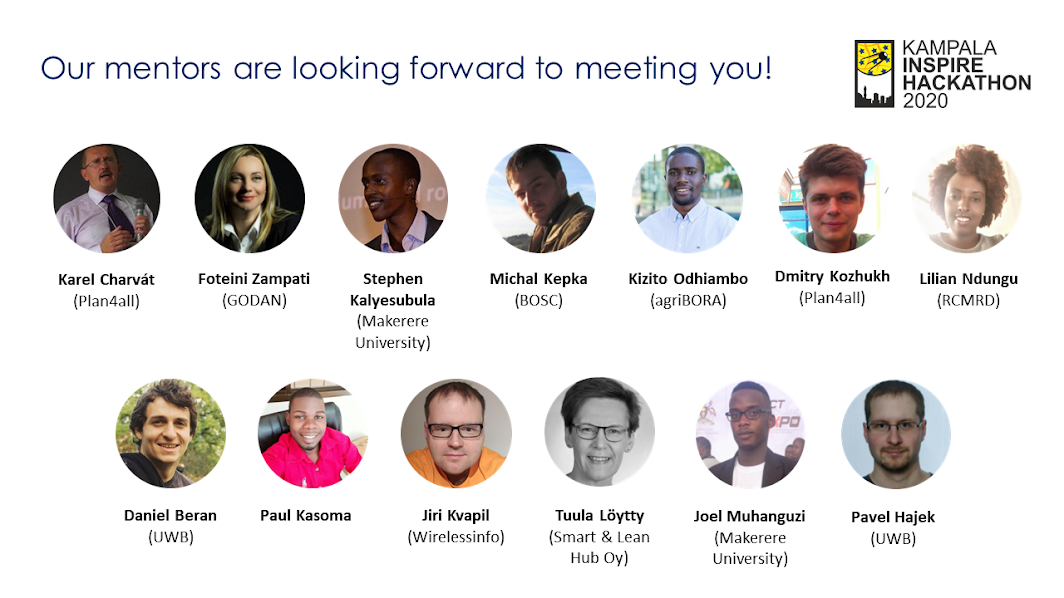The Kampala INSPIRE hackathon started in March concluded with an online event on Wednesday May 6, 2020. The goal of the Kampala INSPIRE Hackathon 2020 was to continue to building and strengthening relationships between several EU projects and African communities that started in 2019 with the Nairobi INSPIRE hackathon. The hackers’ expertise fell into the smart agriculture domain. It encompassed data collection, data analysing and decision support systems. The GIS – GeoSpatial Information – had a centric role. The community was interested in developing soil health, agri- and food systems, mitigating climate change and to secure food supply. The goal of sustainability in the means of economics, society and environment was embedded on the hackers DNA. The Kampala INSPIRE Hackathon 2020 was organised using an unconventional approach, tailored to cater for cross-continental collaboration.
The hackathon started with a set of predefined challenges. Each project had a mentor. The participants of the hackathon can chose to work on any of the predefined projects. In this way, teams were be built to collaborate on the projects. The mentors organised the work and were responsible for the communication in the project teams and acted as team leaders. The projects and their mentors for the Kampala INSPIRE Hackathon 2020 included: Climatic change trends for agriculture, challenge 6 by Pavel Hajek; Open Land Use for Africa challenge 3 by Dmitri Kozhuch; Desert Locust challenge 4 by Winnie Kamau and Maxillian Houl ; Internet of Things Technology (IOT) for Africa challenge 5 by Mike Kepka; SmartAfriHub challenge 2 by Tuula Löytty; EO4FoodSecurity challenge 7 by Karel Charvat; Text Mining and Meta Data challenge 8 by Karel Charvat; Interchangeable map compositions in support of collaborative spatial intelligence challenge 10 by Karel Charvat; Ethical and legal aspects of open data affecting farmers challenge 9 by Foteini Zampati and Transportation related aspects of urban planning - use case of Kampala challenge 1 by Daniel Beran.

RCMRD's participation was as a result of the collaboration with GODAN and we contributed to two challenges. The Smart Afrihub challenge where Lilian Ndungu who leads the Agriculture and Food Security thematic area under SERVIR Eastern and Southern Africa at RCMRD. She presented on available RCMRD open data tools and this resulted in their being added on the smart afrihub portal (https://www.smartafrihub.com/rcmrd-geoportal-and-open-data-portal) and https://www.smartafrihub.com/home/-/blogs/revealing-resources-of-smartafrihub. Lillian also acted as a mentor and provided support in structuring and implementation of the Desert Locust Challenge. This included inviting experts to provide perspectives on current ongoing efforts in fighting desert locust- these included Denis Macharia the Weather and Climate Lead under SERVIR Eastern and Southern Africa at RCMRD, Kenneth Kemucie from IGAD Climate Prediction & Applications Centre (ICPAC) and Catherine Nakalembe of the University of Maryland, (UMD). For those who missed the chance to view the challenge , view the webinar recording at https://www.plan4all.eu/2020/04/webinar-recording-risk-mapping-and-impact-analysis-of-the-desert-locust-invasion-in-east-africa/.
Participants representing all teams joined to make the presentations and share their final results and to celebrate their achievements in an awards ceremony. During the three hours long event, participants learned about the results achieved by 10 teams who addressed the 10 challenges covering agriculture, food security, desert locust, citizen science, traffic and more. The Kampala INSPIRE hackathon gathered more than 200 registered hackers. Despite the unexpected barriers created by COVID-19, the interest of African agriculture researchers, practitioners and other stakeholders was prominent. The hackers represented 42 countries world wide: Africa 20 countries (77 % of registrants), Europe 12 countries (12 percent of registrants) and 11 other countries (11 % of registrants). Throughout the whole hackathon, all teams and mentors did an excellent job and the jury had a very difficult task to select top three teams out of the 10.

In the end, the jury members Suchith Anand (Chief Scientist, GODAN), Lydia Mazzi Keyondo (Head of Department, University of Makerere) and Ian Jarvis (Agriculture and GEOGLAM, GEO) announced the following winners of the Kampala INSPIRE Hackathon in the first place the Challenge 4 Desert Locust including Winnie Kamau (Kenya), Maximilien Houel (France), Elias Cherenet (Ethiopia), Terefe Sodango (Ethiopia), Jecinta Wawira Muriithi (Kenya), Reagan Otukene (Uganda), Nyakato Irene (Uganda), Zakayo Kimuge (Kenya), Ambrose Kamya (Uganda) , Lenah Mwangi (Kenya), Ahmed Mahdav (Iran)i, Miderho Christus (Kenya) emerged winners.
The second position was taken by the SmartAfriHub / Tuula Löytty (Finland), Ssembajwe Ronald (Uganda), Simon Van Kerckhove (Belgium), Samuel Njogo (Kenya), Antoine Kantiza (Burundi), Akaninyene Obot (Nigeria), Felix Kimani Kariuki (Kenya), Esther Wanjiku Maina (Kenya), NGUEfACK jovis Arnold (Cameroon), MEZAFACK Karol lavoine.(Cameroon), Fouagwang Yann Wilfried (Cameroon), Jesus Simal-Gandara (Spain). The third position was taken up by Challenge 6: Climate Change Trends for Africa / Pavel Hajek (Czech Republic), Samuel Ekwacu (Uganda), Jiri Vales (Czech Republic), Karel Jedlicka (Czech Republic). Congratulations to all the winning teams and many thanks for excellent work to all participants: hackers, mentors, and jury!













